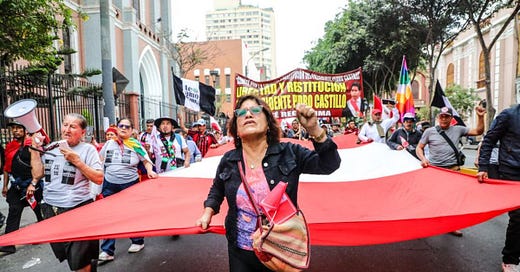Protests against Peruvian President Dina Boluarte’s government reactivated yesterday, with demonstrations and road blocks around the country. Marches in Lima were largely peaceful, though met with an outsized security operative, while isolated incidents involving the police were reported in an Andean region, according to Reuters. (See also Deutsche Welle and Bloomberg.)
Participants in the third “Lima Takeover” demanded Boluarte’s resignation, early elections, a constituent assembly and justice for protesters killed and injured by security forces since December. Not all the demonstrators had the same demands, and some factions seek the liberation of former President Pedro Castillo. (El País)
La República emphasized prudence by both demonstrators and police in Lima. But La Mula notes that there were “significant” clashes in certain instances, when protesters breached a police cordon in the late afternoon to gather outside Congress, and in the Plaza de Armas de Hancavelica, and and the takeover of the Universidad Nacional de Cajamarca. Eight people were wounded during the day, six civilians — including an independent photographer — and two police officers, according to the national ombudsman.
Human rights advocates had said they would monitor for violence after Boluarte said any protests would be taken as a "threat to democracy" and cabinet members warned that police would "legitimately make use of force." (Axios)
Anti-government protests that followed Castillo’s ouster in early December were violently repressed: About 60 people died and almost 2,000 were injured, according to the human rights ombudsman's office.
Guatemala
Ten Guatemalans were added to the U.S. “Engels List,” which identifies people who undermine democratic processes, engage in significant corruption, or obstruct investigations of corruption. Yesterday’s report from the U.S. State Department included judges and a prosecutor involved in a controversial case against Guatemalan journalist José Ruben Zamora. (Al Jazeera, Prensa Libre)
Central America
The U.S. State Department’s report also includes 13 officials and public figures from Nicaragua, 10 from Honduras and six from El Salvador, reports Al Jazeera. They include Mauricio Funes and Salvador Sanchez Ceran, two successive presidents of El Salvador.
Migration
A U.S. federal judge could decide next week regarding the legality of the Biden administration’s temporary asylum restrictions on the southern border, reports the Washington Post.
The “case that could upend the fragile calm that has taken hold in U.S. border cities and reshape America’s role as a refuge for foreigners fleeing harm,” reports the Washington Post.
Regional Relations
Chilean President Gabriel Boric’s strong criticisms of human rights violations in Venezuela and Nicaragua contrast with the stance of many of Latin America’s traditional leftist leaders, particularly Brazilian President Luiz Inácio Lula da Silva, and mark a new rift within the region’s progressives, reports El País.
Speaking at this week’s EU-CELAC summit, Boric said the Russian invasion of Ukraine was “imperial aggression,” a strong stance that Lula dismissed chalked up to rookie anxiety, reports El País.
Brussels supported an Argentina-backed declaration referring to Islas Malvinas at Tuesday’s EU-CELAC summit, which Buenos Aires called a “diplomatic triumph.” UK Prime Minister Rishi Sunak has criticized the EU for its “regrettable choice of words” after its apparent endorsement of Argentina’s term for what the UK calls the Falkland Islands. (Guardian and Guardian)
Lula said he will send the European Union a counter-proposal on the long-delayed trade deal with the South American bloc Mercosur in the coming two or three weeks. (Reuters)
Lula said, yesterday, that he wants to resume the "good and fruitful" relations his country used to have with Africa when he was in office for the first time in the 2000s. (Reuters)
Brazil
“Judicial activism — when the judiciary takes an active role in addressing instability, threats or inequality rather than simply responding to cases brought by third parties” — is of growing interest to scholars, write Gerson Scheidweiler and Tyler Valiquette in the Conversation, comparing the cases of Brazil and the United States.
The increase in Evangelical church membership in Brazil is “one of the most significant social phenomena in Brazilian society over the past three decades … The implications of this rise transcend the religious domain and are leading to profound political and cultural consequences,” according to a report by the Rosa Luxemburg Siftung.
Colombia
A dramatic crash in coca prices in Colombia, and a shifting focus of U.S. drug policy to the opioid crisis, have created a unique opportunity for Colombia to carry out a drug policy reform promised by President Gustavo Petro, writes Joshua Collins in World Politics Review.
Colombia's Minister of Mines and Energy Irene Velez resigned yesterday, after two state bodies opened investigations against her for alleged influence peddling, reports Reuters.
An alleged drug baron wanted in the Netherlands over his suspected involvement in cocaine and methamphetamine was arrested in Colombia, according to Interpol. (Associated Press)
Regional
A UN report on sexual violence in conflict highlights use of women’s and girl’s bodies as weapons of war in Haiti, Colombia and Mexico. “In particular, the UN report emphasizes that entire communities are destabilized through the humiliation and stigma that sexual violence causes. The ways in which impunity perpetuates these illicit acts is even worse,” writes Jineth Bedoya Lima in El País.
Mexico
Opposition senator Xóchitl Gálvez has galvanized Mexico’s 2024 presidential race — a new poll yesterday put her within striking distance of Mexico’s ruling Morena party presidential candidates, reports the Guardian.
Legends of “lost cities” buried in the jungle tend to be exaggerated, but archeologists have actually found a hidden city where pyramids and palaces rose above crowds over 1,000 years ago, with a ball court and terraces now buried and overgrown on Mexico’s Yucatan Peninsula, reports the New York Times.
Tech
Audiences in the region have increasingly been flooded with AI-generated ads, with mixed results, reports Rest of World.
Thank you so much to Jordi Amaral and Arianna Kohan for covering during my vacation — be sure to check out their newsletters: the Americas Migration Brief and The Road to the Casa Rosada.





